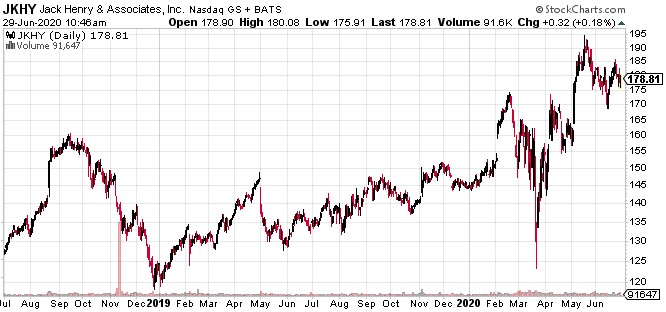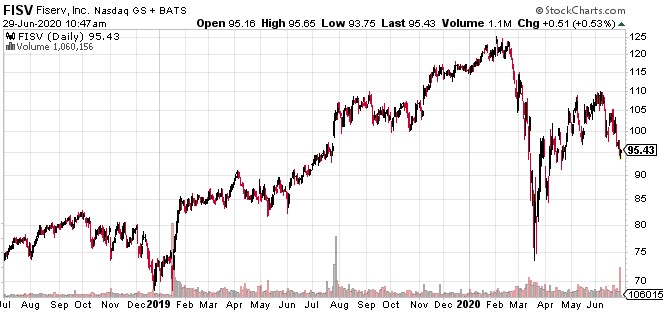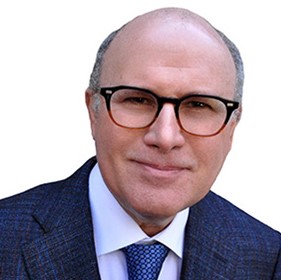In the future, consumers will apply for and receive credit in seconds. They won’t even need a plastic credit card. Everything will be digital, always.
Actually, that is not the future at all. Exclusively digital, tokenized credit is here today. Firms like Mastercard (NYSE: MA, Rated “B-”) plan to do for credit what iTunes did to CDs.
In a Protocol interview, Executive Vice President of Digital Solutions at Mastercard Jorn Lambert explained there was a time when listening to music involved buying CDs and a standalone player. When iTunes made the sale of digital music ubiquitous, the need for physical media players vanished. Vibrant new digital business models quickly evolved.

Mastercard, and its rival Visa (NYSE: V, Rated “B-”), long ago laid the groundwork to do the same with credit cards. It might seem counterintuitive as most people incorrectly equate the pair with plastic credit cards.
In reality, their business is about transaction processing. Removing physical credit cards, at least for some applications, streamlines the business. In the parlance of business types, it reduces friction, substantially.
Lambert says the company recently began working with Apple’s (AAPL: Nasdaq, Rated “B-”) Apple Card, Samsung Money and Amazon.com (Nasdaq: AMZN, Rated “C+”). Patrons can apply for credit directly within the app. They are approved within seconds and can be paying for goods and services instantly. All the authentication occurs digitally on secure servers operating in the Mastercard cloud.
Customers can opt for a physical card too, but they don’t need one. There is no three-digit code on the back of the card to verify. And tokenization, the process of hiding sensitive data, means the standard 16-digit number is irrelevant, as well. Users can tap their smartphones or watches, pay and go. This is the contactless, digital-first future that awaits all of us.
Thankfully, the infrastructure is already in place.
In the United States, most credit card users still dip and swipe, Lambert notes. However, a majority of the very machines they are using at gas stations and department stores are already contactless compatible. It’s only a matter of flipping a virtual switch.
And with 72% smartphone penetration in the United States, according to Statista, contactless digital payments could roll out to most Americans almost overnight.
Digital credit will change everything. Transactions will be more secure, leading to bigger profits at the banks and financial institutions that issue credit. Innovations like machine to machine payments will become possible. One day, software in your car will pay for parking or refueling.
Companies like Mastercard and Visa are obvious winners. These companies are the gatekeepers. They earn a small but durable fee from every transaction within the system.
The big opportunity for investors, however, is the firms helping banks and credit unions move quickly into the digital age. Thousands of local financial institutions will need online banking and payment software upgrades to take advantage of this big trend. They will need bespoke mobile applications to move from dip and swipe to tap and pay.
Jack Henry and Associates (Nasdaq: JKHY, Rated “B”) and Fiserv (Nasdaq: FISV, Rated “C”) build systems to help banks manage payments online and through mobile applications.
Jack Henry began life in 1976 as a tiny software company. The founders operated out of rented space in a small engine repair shop. They helped a handful of regional banks control risks and manage regulatory filings.
Today, the Missouri company services 9,000 financial institutions and has $1.6 billion in annual sales. Its online banking infrastructure is state-of-the-art and perfectly suited for thousands of smaller regional banks trying to embrace the digital future.
For 35 years, Fiserv has been helping all of the rest. Its software has been the backend of choice for leading financial institutions. The Wisconsin company in 2019 committed to getting even bigger. The acquisition of First Data Corp., one of the world’s leading payments providers, created a behemoth. Revenues surged to $10.2 billion, a 74% bump over the previous year.
Both firms have the tools, scale and standing with core customers to take leadership roles in the coming payments revolution. The pandemic and the need for online banking has made customers acutely aware of the need to sharpen their digital game. Widespread tokenized credit and contactless payment will speed development even further.
Something really big is happening with credit. This is a huge opportunity for investors to get in on the ground floor.
Best wishes,
Jon D. Markman





